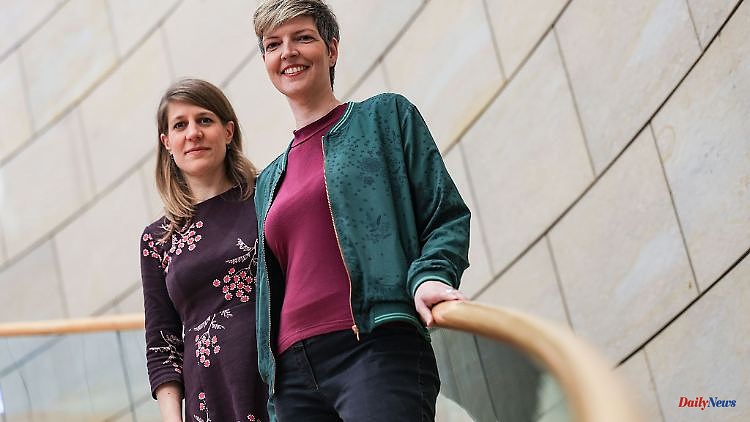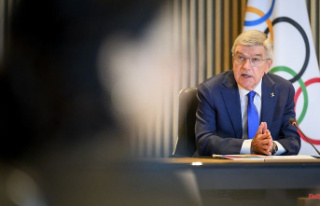The experiment of a coalition of CDU and Greens in North Rhine-Westphalia has been running for almost eight months. The two coalition partners don't make it easy for themselves - the Greens in particular like to have lengthy and detailed discussions.
Düsseldorf (dpa / lnw) - You have already governed together with the SPD, were in the opposition, and the Greens in North Rhine-Westphalia have been forming a coalition with the CDU for almost eight months. After the honeymoon of coalition negotiations, which was still inspired by electoral success, the Greens are now working to achieve their goals.
The two faction leaders Verena Schäffer (36) and Wibke Brems (42) only give a glimpse of the fact that the black-green experiment does not always run smoothly. Externally, Schäffer emphasizes: "The cooperation between us and the CDU, especially the leadership of the parliamentary group, is good and trusting." But it is also clear "that we Greens and the CDU often have different perspectives on the issues and that we are therefore also in a lot of discourse."
The first major stress test for the Green faction was the eviction of the brown coal village of Lützerath in January. Brems speaks of "a lot of need for exchange" in the group, which should mean something like: There were big discussions. But it didn't come to an open fight. "We don't attack each other personally," says Brems.
The opponents of lignite had accused the Greens of betraying their ideals. That should have hit the faction hard, which unreservedly supported the eviction decision for Lützerath. "It is clear that Lützerath was not an easy subject," says Schäffer. "We Greens have the protest against lignite and Garzweiler in our DNA. We have always fought to downsize Garzweiler, and we managed to do that."
The fact that Lützerath was demolished anyway in order to clear away the climate-damaging lignite there was bitter for the Greens. "There is now all the more agreement that we are going to deliver even more speed in the expansion of renewables," says Schäffer.
The Greens are now putting pressure on the CDU to achieve the climate policy goals set out in the coalition agreement. Brems expressed open dissatisfaction with the CDU-led Ministry of Construction. Minister Ina Scharrenbach's house has still not submitted a regulation for the first step in the solar obligation, says Brems. "I'm disappointed." Because the first step - the solar obligation for public buildings - should actually come on January 1st - that's what the coalition agreement says.
"Everyone has to do more to work on solutions, that has to be the claim in this coalition," says energy expert Brems. For example, the first steps towards abolishing the minimum distances for wind turbines have been taken in the expansion of wind power. But as with solar energy, there is still a lot to do.
According to the coalition agreement, 1,000 additional wind turbines are to be erected in NRW within five years. According to figures from the State Association for Renewable Energies (LEE) NRW, only 98 new wind turbines were put into operation in NRW in 2022. The renewable energy industry is pushing for more speed. And the coalition is also aware that it must stretch further in order to achieve the ambitious goal.
The parliamentary group also wants to put pressure on the appointment of an independent police commissioner in the state parliament - a matter of the heart only for the Greens. After the case of the youth who was shot by the police in Dortmund, a lot of trust in the police was lost, says Schäffer. "I am convinced that this position will further strengthen confidence in the police." As an expert on domestic politics, Schäffer had already maintained a good relationship with CDU Interior Minister Herbert Reul during the opposition period.
For six months, the two not "old hands" at all, Schäffer and Brems, have been leading the Greens parliamentary group, which has grown to an impressive 39 MPs, as dual female leaders. Both have been in the state parliament since 2010 - and were once among the youngest members of parliament, like the six parliamentary group members who are under 30 years old. In general, the faction has rejuvenated. Another ten members are under 40.
Brems and Schäffer have experienced red-green, opposition and currently black-green. You are on first name terms with members of parliament from the SPD and FDP, and sometimes stand with them in the coffee bar and exchange "nice words". Was it perhaps easier to govern together with the SPD? "It's hard to compare," says Brems. There is not only "the CDU" or "the SPD". There are now other MPs in the state parliament than before.
There are 31 newcomers to the Greens alone, and only 8 MPs were members of the state parliament before the election. "A coalition is always dependent on the people," says Brems. "Of course, we also had extreme conflicts during the red-green government, for example on the issue of phasing out coal. We hardly found each other there."
Schäffer also finds the constellation with the CDU so exciting "because we bring the perspectives of different milieus - especially in such a crisis-ridden time". The leaders of the parliamentary group don't dismiss cultural differences to the CDU: "Perhaps we Greens are sometimes a bit exhausting for the CDU because we always want to discuss everything three times," says Schäffer. "It's in our nature, that's how we are green."












